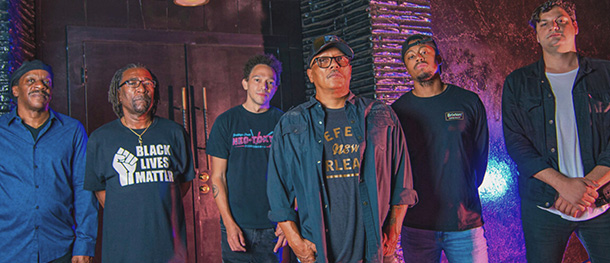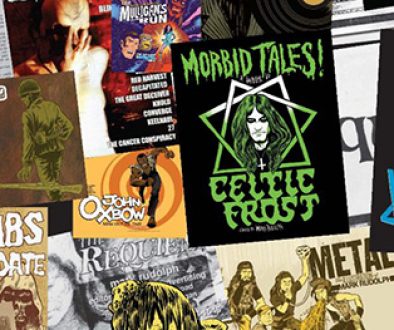DUMPSTAPHUNK – United Nation Stomp ft. Marcus King
New Orleans funk powerhouse Dumpstaphunk have just unleashed a rendition of Buddy Miles’s 1973 acid-fuelled blues anthem “United Nations Stomp,” the third single from ‘Where Do We Go From Here,’ their first full-length album in seven years. Ignited by the exploding lead guitar of special guest Marcus King, the epic jam invokes the vintage spirit of Jimi Hendrix and Cream coupled with a touch of urgent musical angst that could be easily playlist alongside modern contemporaries Rage Against The Machine or Red Hot Chili Peppers. The track, mixed by Beastie Boys producer, Mario Caldato Jr., also features guitar legend Waddy Wachtel (Keith Richards, Rolling Stones, Stevie Nicks) in a crescendoing super-jam that further cements Dumpstaphunk’s status as the heaviest funk-rock band in the land, as they gear up to release what is undeniably the most powerful and politically pointed album of their career.
“First, I’m a big fan of Buddy Miles. I like the groove and the line you can dance to the rhythm of a funky beat! With a strong message, it talks about peace, love and harmony – something we all need today. This song was originally released 47 years ago by Buddy Miles in 1973 on his album Boogie Bear.” – Tony Hall
The album is available to pre-order HERE.
‘Where Do We Go From Here’ is a sharply relevant statement, even more-so than the group anticipated during writing and recording sessions just prior to the unprecedented events of the last year. The band released the album’s title track “Where Do We Go From Here” in August 2020, to commemorate the 15th anniversary of Hurricane Katrina, earning praise from the New York Times for its “slinky funk backbeat” and “gospel determination.” On the eve of the presidential election the band strategically released the single “Justice 2020” (featuring Chali 2na and Trombone Shorty), which became an unofficial anthem of the social justice movement. The powerful music video led the New York Times to name “Justice 2020” one of the “Top 20 Songs of 2020,” in part to the music video’s strong message alluding to social injustice, systemic racism, police brutality and the need for change, while also demanding lyrically that as human beings “We Are All Beautiful.”
The band’s arsenal of classic and modern influences can be heard throughout the new album, a distinctive mix of genuine New Orleans funk, old school R&B and guitar fueled modern rock; from the slap-bass rave “Make It After All” to the band’s contemporary renderings of New Orleans R&B rarities (the 1975 Blackmail gem “Let’s Get At It”) and early Seventies classics (Sly and the Family Stone’s “In Time”). “We hope people can hear the new songs and are inclined to dance, and inspired to think at the same time,” says Ivan, speaking to the new album’s delicate balance between topic material and dance-floor rockers.
Over the past 17 years, Dumpstaphunk has earned its reputation as a highly respected next-generation New Orleans musical institution, the type of band whose live performances have attracted sit-ins from legends like Carlos Santana, Bob Weir, George Clinton and members of Phish. Alongside original core members Tony Hall and Nick Daniels, and the new additions of Alex Wasily, Ryan Nyther and drummer Devin Trusclair, Ivan and Ian Neville (the sons of Aaron Neville and Art “Poppa Funk” Neville respectively) have built upon their family’s iconic Nola legacy as they’ve transformed Dumpstaphunk into the city’s pre-eminent 21st-century funk-fusion export, resulting in recent career highlights like their July 2019 opening gig for the Rolling Stones on their home turf at the New Orleans Mercedes Benz Superdome.
Modernizing and reinvigorating the Neville/Meters family groove has been one of the driving forces of Dumpstaphunk since the band spontaneously formed during New Orleans Jazz & Heritage Festival in 2003. Where Do We Go From Here is perhaps the best evidence yet of Dumpstaphunk’s ability to strengthen and transform their singular Crescent City roots in combination with the deeper outside musical and philosophical influences on which the band is founded.
“Obviously, the New Orleans history is just embedded in us, but we manage to incorporate all the other stuff we’ve listened to over the years,” says Ivan. “We’re representing a legacy, but we’re reimagining a lot of it, too.”







